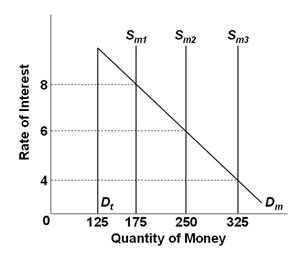Suppose that Hawaii legalizes casino gambling. By imposing a tax on casino revenues, the state government is able to eliminate the state income tax on wages. What is likely to be the effect on the labor supply curve in Hawaii?
What will be an ideal response?
Eliminating the income tax on wages increases the opportunity cost of leisure because the after-tax wage is now higher than it was. Workers will also earn more income for any given number of hours worked. Whether workers will end up supplying more hours at each wage rate depends on whether the substitution effect of this increase in the after-tax wage is greater than the income effect.
You might also like to view...
Refer to the graph , in which Dt is the transactions demand for money, Dm is the total demand for money, and Sm is the supply of money. The market is initially in equilibrium at a 6 percent interest rate. If the money supply increases, then Sm2 will shift to:

A. Sm3 and the interest rate will be 4 percent
B. Sm3 and the interest rate will be 8 percent
C. Sm1 and the interest rate will be 8 percent
D. Sm1 and the interest rate will be 4 percent
According to the quantity theory of money,
a) the quantity of money determines the long run equilibrium price level b) the amount of money in the economy determines the long run quantity of output c) money affects the aggregate supply curve, while the aggregate demand curve determines real output d) the money supply only affects the economy in the long run, not in the short run e) the full-capacity level of output determines the supply of money needed in the economy